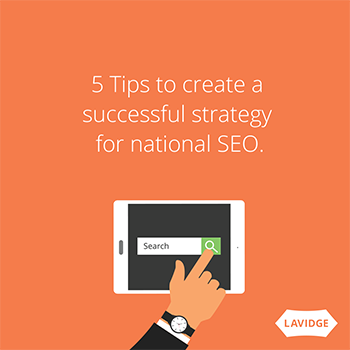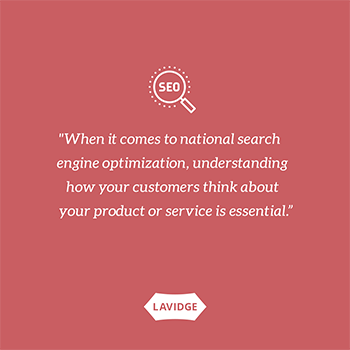Sign up for our LAVY email
and get our bi-monthly newsletter.
When it comes to search engine optimization, understanding how your customers think about your product or service is essential, especially for technology companies who are launching products and services so new that no one knows they need them, let alone how to search for them.
Most technology companies use inward-facing terms to describe their offerings and don't address which search terms potential customers actually use. That’s why it’s important to ask yourself: How does my potential customer perceive it? What words or phrases would decision makers type or speak when researching my offerings?
 Flipping the perspective on search strategy to look through the eyes of your customers takes discipline and a different approach. Following are some additional questions to ask yourself when mapping out your SEO strategy:
Flipping the perspective on search strategy to look through the eyes of your customers takes discipline and a different approach. Following are some additional questions to ask yourself when mapping out your SEO strategy:
Every website is associated with more than just its target keywords. Do you know which words and phrases drive traffic to your site? Words and phrases related to the ones you actively monitor to improve your search engine page rank make up your universe. If you sell a new Internet of Things-enabled gadget consumers are not yet aware exists, for example, your keyword universe might include thousands of words in addition to your branded terms. Your target client knows how to search using words describing their pain point. Use them in your content to position yourself as offering the best solution.
An experienced consultant or a variety of self-serve tools can help you identify keywords and phrases organically in your universe, and spot opportunities to add new ones to your content which will help you capture organic traffic.
Need more ideas? Take a peek at the competition's online presence. An experienced consultant can analyze what you’re up against so you can make informed decisions on how to match and counteract the competition’s search content marketing efforts.

It pays to be thoughtful about the customer journey when planning keyword marketing strategy. Because potential buyers change the words and phrases they use as they advance through the customer journey, your keyword strategy should follow a similar progression.
Customers who are just becoming aware of what they need tend to use broad search terms such as “smart toaster” or “connected toaster.” A customer further along the sales funnel might use long-tail keyword phrases such as “toaster that cooks eggs,” “create pictures on my toast with a phone app,” or “weather forecasting toaster.” This comes into play in lead generation, especially when retargeting customers who have already visited your site and have likely gained more information about what they need.
It doesn’t matter how well you rank for “old-fashioned toaster” or “novelty toaster” if related sales represent a minor share of your product offerings or the profit margin for the product is low. Even worse, your website might rank for seemingly random words with little connection to your brand—or for unsavory search terms.
The best choice of keywords also depends on the size of your business in comparison to your competitors. In general, a larger business can afford to rank for broader search terms. Small businesses might need to get some quick wins with SEO content leveraging long-tail keywords and phrases. They can always work their way up with a content creation plan which grows along with improved conversion rates.

Not all keywords are created equal. Our Visibility Impact Index focuses SEO efforts on keywords with the potential to drive traffic and conversions. We research hundreds or thousands of them at a time to identify keywords and phrases most likely to be profitable, so you can measure impact in terms of ROI instead of impressions alone.
We know. It’s a lot. LAVIDGE experts can help your company audit its current SEO universe, develop a search engine optimization strategy, and competitively bid the most pertinent keywords to use in content or media marketing your product and brand.
Ready for a one-on-one discussion? Give our SEO and search marketing agency a call at 480.998.2600 or send email to info@lavidge.com.
Courtesy of searchengineland.com, here’s a high-level look at "How To Increase Qualified B2B SEO Traffic.”

This article is a brief abstract of our exclusive and authoritative study that takes the guesswork out of marketing to business-to-business technology buyers. Rather than speculating about what will drive them to action, we've asked them.
Sign up for our LAVY email
and get our bi-monthly newsletter.